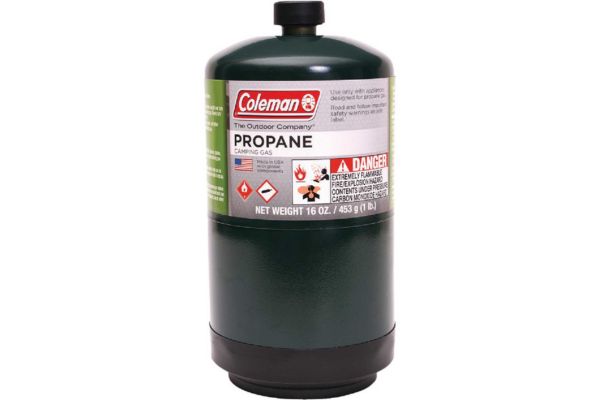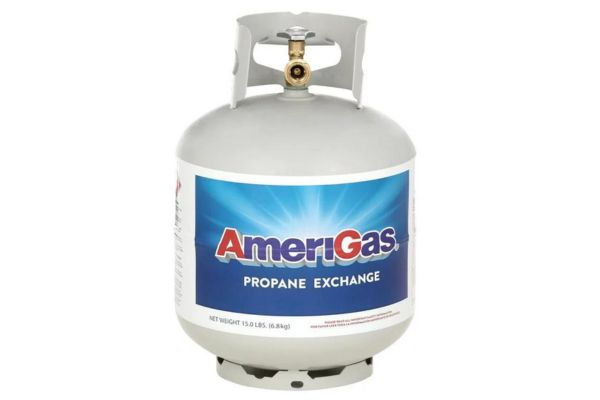Propane is a popular choice for outdoor enthusiasts who love to go camping frequently. This propane tank helps provide a convenient source of fuel for cooking, heating, and lighting while camping. But a common question that arises among most of the campers is about the life of a camping propane tank. Well, the duration of a propane tank depends on various factors, such as the size of the tank, its consumption rate, and the number of appliances used by the tank.
This article is all about how these factors affect the life of a camping propane tank. Let’s understand them in detail.
Understanding Camping Propane Tank
Let’s have a look at the wide variety of camping propane tanks and in what sizes they come according to the propane. But remember, if your propane tank exceeds the size of 5 lbs, then it will not be easy to pack and carry on a camping trip. Propane Tanks can also be used as an alternative for cooking while camping if you cannot find firewood at the campsite. Here are the specifications of different propane tanks.
| TANK SIZE | AMOUNT OF PROPANE | BURN TIME |
| 1 lb | .25 gal / 32 oz | 2 hours |
| 5 lb | 1 gal / 128 oz | 8 hours |
| 11 lb | 2 gal / 256 oz | 16 hours |
| 15 lb | 3.5 gal / 448 oz | 28 hours |
| 20 lb | 4 gal / 512 oz | 32 hours |
Propane-Fueled Appliances
Let’s understand how many types of propane-fueled appliances are used and how much propane they consume:
- Furnace – Furnace uses the most propane
- Portable Propane Heater – It is much more efficient than a built-in furnace
- Stovetop and Oven – These generally use very little propane but depends on how much and how long you cook.
- Water Heater – Depends on how many showers are being taken and how frequently and how often dishes are washed. This also likely depends on how often you’re connected to shore power since that adds the ability (in most RVs) to heat water with electricity instead of propane.
- RV Fridge – RV fridges sip propane and are very efficient.
- Generator – Some RVers travel with a generator that runs on propane, and of course will depend on how much you run it.
How Long Does Propane Tank Last?
Now, here’s the answer for how long a camping propane tank lasts. Different propane tanks have different features and lifespans. We have discussed all of them below. Have a look:
A 1 LB Propane Tank

- A 1 lb Propane Tank is the most commonly used propane tank for camping.
- It can serve you with every service you need on your long camping trip.
- This propane tank is easy to carry as it fits in your backpack comfortably. So, you can divide the weight of this propane tank with others on the trip.
- A single 1 lb propane tank canister will last you up to 2 hours of burn time.
A 5 Lb Propane Tank Last?

- This propane tank is slightly larger than the 1 lb canister.
- You can prefer this size canister if you’re planning on using a lot of fuel on your longer trek.
- This tank is comparatively heavy and cannot be carried in your backpack. So, it cannot be carried frequently on the trips.
- A 5 lb propane tank will last you up to 8 hours of burn time.
An 11 Lb Propane Tank Last?

- These propane tanks which are 11 lb and above should be only carried in a car or in a RV camping.
- These are too heavy to take in a backpack with you while camping and they also require a large space.
- If you want to use a good amount of fuel on your trip and avoid refilling then these tanks are good to choose.
- With up to 16 hours of burn time, 11 lb tanks can be a good option for longer trips.
A 15 Lb Propane Tank Last?

- If you are planning a long car camping trip or an RV camping for a longer period of time, you can go with this 15 lb Propane Tank.
- If you like to cook and do not want to refill your tanks on your trip, then this tank is the best option.
- A 15 lb propane tank lasts up to 25-30 hours of cooking time.
- You can also upgrade to 20 lb tanks and more to get the benefit of 32+ hours of cooking time.
Factors Affecting The Life Of A Camping Propane Tank
Some factors can affect the lifespan of a propane tank adversely if not taken into consideration properly. If you are a frequent camper or love longer car camping trips and do not want to spoil your trip, you need to understand these factors and their role in reducing the duration of a propane tank which are described below:
Tank Size
To look for the size of the propane tank is an important factor that affects its lifespan. Some of the common sizes for camping propane tanks are 1-pound, 5-pound, 10-pound, and 20-pound cylinders. Larger propane tanks can hold more propane and last longer as compared to smaller ones.
Consumption Rate
Different camping appliances have their own propane consumption rates. So, the rate at which you consume propane from a propane tank on your trip also plays a significant role in making a tank work to the last. For example, a camping stove uses less propane as compared to a portable heater or a propane lantern.
Type of Appliances
What type of camping appliances you are using on your camping trip also affects propane consumption. Appliances like grills and heaters use more propane than low-output devices such as stoves or lanterns. You need to understand the BTU rating of your appliances to know how much propane your appliance consumes and whether it is compatible with the propane tank or not.
Environmental Factors
Temperature and altitude can directly affect propane vaporization rates. If you are using a propane tank at a colder temperature, it will vaporize propane slowly. This can affect the efficiency of your appliances as well as the tank. If you are at a higher altitude, this will vaporize propane slowly. At higher altitudes, the atmospheric pressure is low which affects the propane gas in your tank.
Usage Patterns
Your usage patterns of a propane tank also result in the shortening of the propane tank’s lifespan. Make sure to regularly monitor your appliances and turn them off when they are not in use. Improve your way of cooking on a trip, it will extend the life of your propane tank.
Calculating Usage
To check how long your propane tank will last, use the BTU ratings of your appliances and the total BTU capacity of the tank.
How to calculate
Divide the tank’s total BTU capacity by the combined BTU rating of your appliances to get an approximate duration. Also remember, that this is a rough estimate, and actual usage may vary.
Safety Considerations
It is essential to follow proper safety guidelines mentioned on the propane tank you are using on your trip, and store, and transport propane tanks securely. Replace tanks that show signs of damage or wear.
Read more: How To Insulate A Tent For Winter Camping
How To Extend The Lifespan Of Your Propane Tank
Regular Inspection and Maintenance
Make sure to visually inspect your propane regularly tank in order to check for signs of rust, corrosion, or damage and resolve the issue immediately to prevent deterioration if there is any. Ensure that the tank’s valves and fittings are in good condition.
Secure Storage
Find a cool, dry, and well-ventilated area to store propane tanks and keep them away from direct sunlight and extreme temperatures. Proper storage helps protect the tank from environmental factors which affect its structure.
Avoid Overfilling
Do not overfill your propane tank. Remember, overfilling can lead to safety hazards and reduce its efficiency. Follow the instructions given on the product and fill according to the tank’s recommended fill level. There is always a “maximum fill” line. Overfilled tanks can cause valves to malfunction and may result in gas leakage.
Use Appliances Efficiently:
Efficient usage of propane-fueled appliances can extend the life of a propane tank. To conserve fuel, turn off appliances when not in use.
Transportation Safety
If you are transporting a propane tank, make sure it is properly settled in an upright position. Use a secure tank bracket, and always check the tank in a moving vehicle. Providing adequate ventilation during transport is necessary to prevent the gathering of propane fumes in covered vehicles.
Consider Underground Installation
If you have larger propane tanks and cannot find a safe space to store them, install them underground. Buried tanks are less exposed to external factors. Also, make sure that they are properly installed in order to prevent any hazards.
Schedule Professional Inspections
Always schedule periodic inspections through professionals to check the overall condition of your propane tank. Those certified technicians can identify issues, test safety features, and guide you on how to maximize the tank’s lifespan.
Follow Manufacturer Guidelines
Focus on the manufacturer’s guidelines and recommendations for your propane tank first. Each tank may have varied specifications regarding its usage, maintenance, and safety, so familiarize yourself with these guidelines to ensure proper care.
Conclusion
In conclusion, there are various factors that affect the duration of a camping propane tank. These are tank size, consumption rate, appliance efficiency, environmental conditions, usage patterns, etc. You need to regularly monitor your propane levels, practice efficient usage, and understand the specifications of your camping appliances properly. This can help ensure a reliable and enjoyable camping experience with a propane tank.
FAQs
Q1. Can I refill disposable propane cylinders used for camping?
Refilling disposable propane cylinders is generally not recommended, as they are designed for single use. Reusable refillable cylinders, such as those in 1-pound or larger sizes, can be refilled at propane filling stations.
Q2. How do I safely transport and store camping propane tanks?
Ensure propane tanks are stored and transported upright in a well-ventilated area. Use a secure tank bracket if available, and avoid exposing tanks to direct sunlight or extreme temperatures. Always follow the safety guidelines provided by the tank manufacturer.
Q3. Can I use propane heaters inside my tent during camping trips?
While propane heaters can provide warmth, using them inside tents poses safety risks, including carbon monoxide poisoning and fire hazards. It’s recommended to use heaters designed for indoor use and to keep tents well-ventilated.
Q4. What signs indicate that a propane tank should be replaced?
Signs of wear, rust, or corrosion on the tank, damaged valves or fittings, or difficulty in igniting appliances may indicate a need for tank replacement. Always prioritize safety and replace tanks showing signs of damage.
You may also like:

